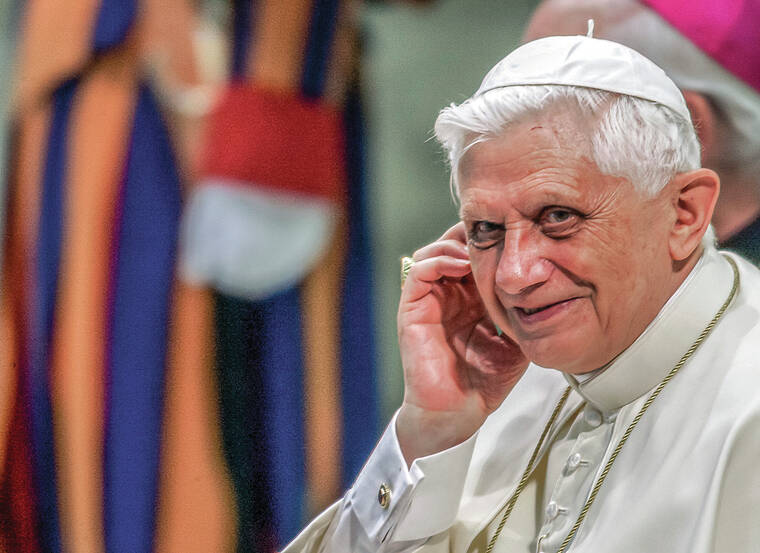Benedict XVI, reluctant pope who chose to retire, dies at 95
VATICAN CITY — He was the reluctant pope, a shy bookworm who preferred solitary walks in the Alps and Mozart piano concertos to the public glare and majesty of Vatican pageantry. When Cardinal Joseph Ratzinger became Pope Benedict XVI and was thrust into the footsteps of his beloved and charismatic predecessor, he said he felt a guillotine had come down on him.
So it should have come as little surprise that with a few words uttered in Latin on a Vatican holiday in 2013, Benedict ended it all, announcing that he would become the first pope in 600 years to resign.
ADVERTISING
His dramatic exit paved the way for Pope Francis’ election and created the unprecedented arrangement of two popes, living side-by-side in the Vatican gardens. And it likely won’t be a one-off, given that Francis has said Benedict “opened the door” for other popes to follow suit.
Francis praised Benedict in comments on Saturday during a New Year’s Eve service held at St. Peter’s Basilica.
“Only God knows the value and the strength of his intercession, of his sacrifices offered for the good of the Church,” Francis said.
The Vatican announced that Benedict died Saturday at his home in the Vatican at age 95. Francis himself will celebrate Benedict’s funeral Mass on Thursday, to which only Italy and Germany were asked to send official delegations, closing out an unprecedented chapter in the history of the papacy with a reigning pope eulogizing a retired one.
The intellectual German theologian, whose mission was to reawaken Christianity in a secularized and indifferent Europe, was forced to shoulder the brunt of the sex abuse scandal that festered unattended under St. John Paul II. Then, as he planned to make a quiet exit from the papacy, another scandal erupted when his own butler stole his personal papers and gave them to a journalist — leading to revelations that laid bare the need for a reformer pope to clean up the Vatican’s act.
In between crises, Benedict pursued his single-minded vision to rekindle faith in a world that he frequently lamented seemed to think it could do without God.
“In vast areas of the world today, there is a strange forgetfulness of God,” he told 1 million young people gathered on a vast field for his first foreign trip as pope, World Youth Day in Cologne, Germany, in 2005. “It seems as if everything would be just the same even without Him.”
He echoed that theme in his final will released by the Vatican on Saturday night, urging the faithful especially in his homeland to “stand firm in the faith!” Two pages in length and dated 2006, the will also touched on a theme dear to his heart of the beneficial dialogue between faith and reason.
With some decisive, often controversial moves, he tried to remind Europe of its Christian heritage. And he set the Catholic Church on a conservative, tradition-minded path that often alienated progressives. He relaxed restrictions on celebrating the old Latin Mass and launched a crackdown on American nuns, insisting that the church stay true to its doctrine and traditions in the face of a changing world.
It was a path that in many ways was reversed by his successor, Francis, whose mercy-over-morals priorities alienated the traditionalists who had been so indulged by Benedict.
Those conservatives spent much of Francis’ reform-minded papacy — and Benedict’s waning years in retirement — nostalgic for the good old days of the German pope, when doctrine and law seemed paramount and the church’s moral teachings clear. They were never more outraged than when Francis reversed Benedict’s edict to allow greater celebration of the old Latin Mass.
Benedict’s style couldn’t have been more different from that of John Paul or Francis. No globe-trotting media darling or populist, Benedict was a teacher and theologian to the core: quiet and pensive with a fierce mind. He spoke in paragraphs, not soundbites. He had a weakness for orange Fanta, cats as well as his beloved library; when he was elected pope, he had his entire study moved — as is — from his apartment just outside the Vatican walls into the Apostolic Palace. The books followed him to his retirement home.
“In them are all my advisers,” he said in the 2010 book-length interview, “Light of the World.” “I know every nook and cranny, and everything has its history.”
Like his predecessor, Benedict made reaching out to Jews a hallmark of his papacy. His first official act as pope was a letter to Rome’s Jewish community and he became the second pope in history, after John Paul, to enter a synagogue.
In his 2011 book, “Jesus of Nazareth,” Benedict made a sweeping exoneration of the Jewish people for the death of Christ, explaining biblically and theologically why there was no basis in Scripture for the argument that the Jewish people as a whole were responsible for Jesus’ death.
“It’s very clear Benedict is a true friend of the Jewish people,” said Rabbi David Rosen, who heads the interreligious relations office for the American Jewish Committee, at the time of Benedict’s retirement.


